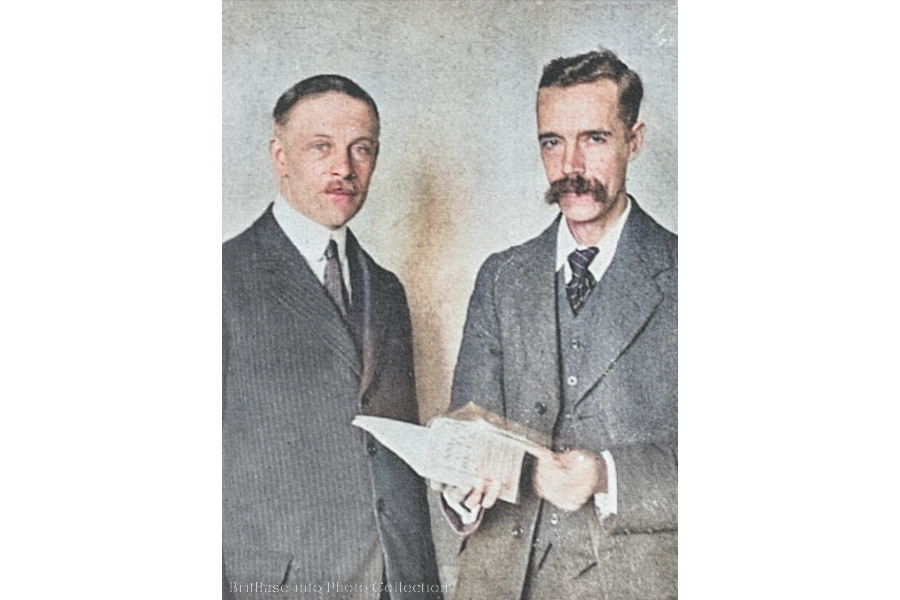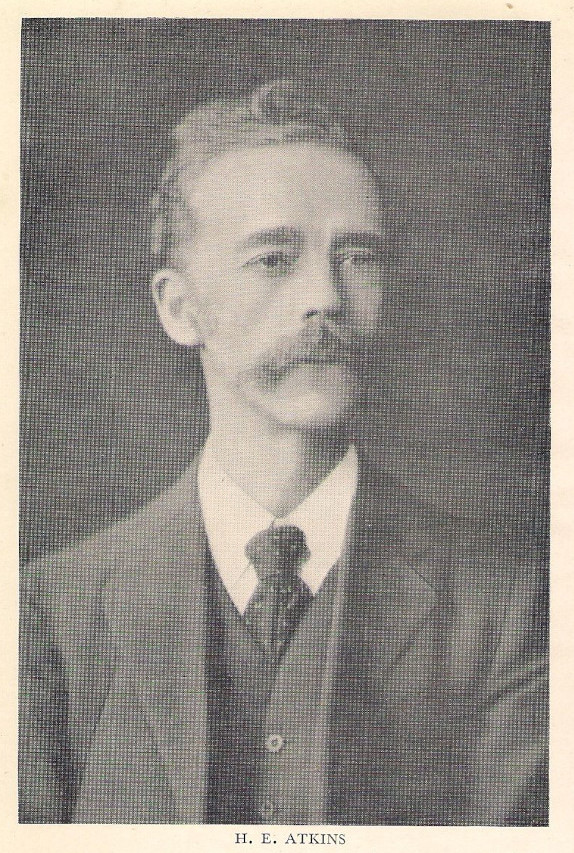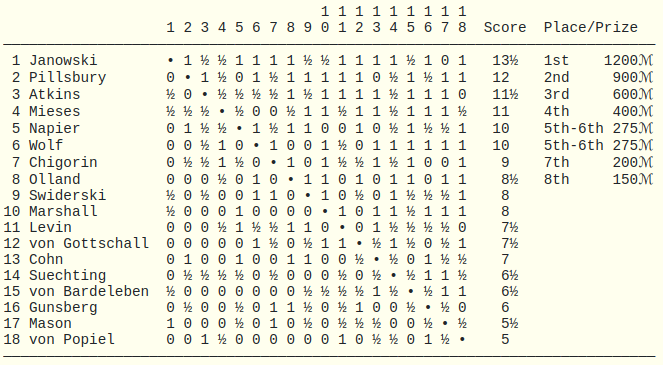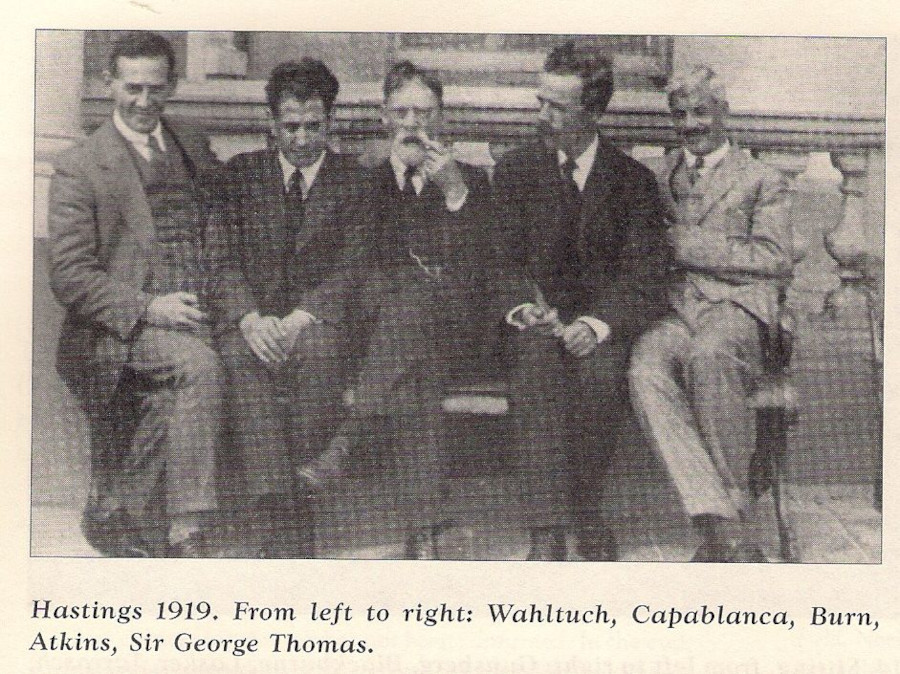


 Atkins was born in Leicester, England on August 20, 1872. He was the fifth child of Edward Atkins, a vicar of St. Nicholas Church, and Jane Atkins. Henry had two older brothers, Edward, and George, and three sisters, Elizabeth, Margaret, and Emma.
Atkins was born in Leicester, England on August 20, 1872. He was the fifth child of Edward Atkins, a vicar of St. Nicholas Church, and Jane Atkins. Henry had two older brothers, Edward, and George, and three sisters, Elizabeth, Margaret, and Emma.
Atkins learned chess from one of his brothers at the tender age of four. In 1880, he was admitted to the Wyggeston Boys Grammar School. Two years later, he joined the Wyggeston Chess Club.
One of Atkins’ sisters gave him a copy of Howard Staunton’s treatise, The Chess Player’s Handbook, which he studied closely. In 1887, he joined the Leicester Chess Club. Two years later, at the age of 17, he was the club’s top player and champion of Leicester.
In 1890, Atkins went to Peterhouse College in Cambridge where he gained a scholarship in Mathematics. His proficiency in this field was probably inherited from his father, who was once a Mathematics teacher. He played first board for the school, and in four years of collegiate competition he lost only one game.
After college, Atkins became a Mathematics teacher himself at the Northampton County Modern School. He then returned to the Wyggeston Boys Grammar School to teach from 1902 to 1908. In 1909, he became the principal of Huddersfield College, a post he held until his retirement in 1936.
In his first British Championship in Hastings in 1904, Atkins tied for first but lost the four-game play-off to William Napier. His domination as British champion would then begin the following year. He won in Southport 1905, Shrewsbury 1906, London 1907, Tunebridge Wells 1908, Scarborough 1909, Oxford 1910, and Glasgow 1911.
Due to his profession, Atkins saw chess merely as a hobby and hardly studied seriously. He would stay away from the game for many years at a time. After winning his seventh consecutive national title in 1911, he took one of his long breaks from chess. He reappeared in 1924 and duly claimed his eight title that year in Southport. The following year, 1925, he clinched his ninth and last title in Stratford on Avon.
As his work limited his ability to travel, Atkins participated in only a few international tournaments. His results, however, were no less remarkable. In his first one, the minor tournament of Hastings 1895, he finished third behind Geza Maroczy and Rudolf Johannes Loman. Atkins was named the Amateur British Champion, as Maroczy’s and Loman’s nationalities prevented them from holding the prestigious title. Four years later, in 1899, Atkins made his first appearance in continental chess at the Amsterdam International Amateur Tournament. He defeated every single one of his fifteen opponents. His finest achievement, perhaps, was at the 13th DSB Congress (Hanover 1902), where he finished third with 11½ points, behind Harry Nelson Pillsbury (13½) and David Janowski (12). Below him were such masters as Jacques Mieses, Napier, Mikhail Chigorin, Frank Marshall, Isidor Gunsberg, Heinrich Wolf, and James Mason.

Atkins also played in London 1922, and represented England in the 1927 London and 1935 Warsaw Chess Olympiads. In these five international events - Amsterdam 1899, Hanover 1902, London 1922, and the Chess Olympiads of 1927 and 1935 - he scored 63.2 percent.
Atkins played in his last British Championship at the age of 65 in 1937 and placed third. He married Elspeth Skene Wilson in 1922, but it is not known if they had children.
After his retirement as principal of Huddersfield College in 1936, Atkins returned to Leicester where he actively participated in the county championships. In the 1938-1939 season, Leicester beat Worcestershire for the title. He played a total of 76 games in these county competitions, amassing a remarkable record of 36 wins and 40 draws.
World War II curtailed chess activities, and by the time it was over, Atkins was already in his seventies. He continued to attend the Leicester club but only in brief spells, preferring to assist adjudications than play serious chess.
In 1950, FIDE awarded Atkins the International Master title in recognition of his past achievements.

Atkins, without doubt, was one of the strongest amateurs ever to play the game. Chessmetrics ranks him as No. 6 in the world from November 1902 to February 1903. Many regard him as the greatest British player, even ahead of Blackburne and Staunton. The World Champion, Emanuel Lasker, believed that if he had devoted more time to chess, he would have become one of the world's leading players. Sir George Thomas, one of Britain's leading players in the first half of the 20th century, shared Lasker’s regard for Atkins. He wrote:
H. E. Atkins ranks, indisputably, as the greatest figure in English chess since Amos Burn, and only lack of opportunity prevented him, in my opinion, from definitely establishing his position in the world championship class.
Atkins passed away on January 31, 1955. Shortly after his death, the British Chess Magazine published the following obituary written by RN Coles:
With the passing on January 31st, at the age of eighty-two of Henry Ernest Atkins, the chess world has lost a recognized international master, and British chess one of its strongest players of all time. Yet Atkins was the despair of chess enthusiasts because he played so little international chess and confined himself largely — and at that intermittently — to local affairs, where the strength of most of his opponents could hardly extend him. One leading player recently regretted that Atkins spent so much time “in the wilds,” but Atkins would have taken an opposite view and have considered that he was “in the wilds” if he had spent more of his time playing chess; teaching was his whole life, and the game of chess he insisted on treating as a game.
Atkins vs. Bleijkmans - 27th DCA Congress (Amsterdam, 1899)
Atkins studied Wilhelm Steinitz’s games thoroughly and adopted his clean, positional playing style. In Europe, he became known as “der kleine Steinitz” or “the little Steinitz”. The following game, for instance, is a brilliant positional crush:
Tartakower vs. Atkins (London, 1922)
Atkins, however, could also play a fine attack if presented the opportunity. Here is his victory in London 1922 against the great Savielly Tartakower:
Atkins vs. Yates - British Championship Play-offs (Bradford, 1912)
Here we have another impressive Atkins attack, this time against his fellow-British champion, Frederick Dewhurst Yates. After gaining significant material advantage, Atkins steers towards a winning endgame.
Atkins vs. Rubinstein (London, 1922)
In addition to his victory over Tartakower, Atkins also defeated Akiba Rubinstein during the London 1922 tournament. Here is their game.
Mason vs. Atkins - 13th DSB Congress (Hanover, 1902)
Atkins’ pawn storm leaves James Mason helpless.
Atkins vs. Blackburne - British Championship (Scarborough, 1909)
Finally, here is another strong positional game. Atkins dominates Joseph Henry “The Black Death” Blackburne on his way to winning his fifth British Championship.
| Advertising |